Articles

LucasArts' Secret History #5: The Secret of Monkey Island Our Review
We delve into secret LucasArts past once more to unearth The Secret of Monkey Island. The world is divided into two people: those who have played this game, and those that really should. Which side are you on?
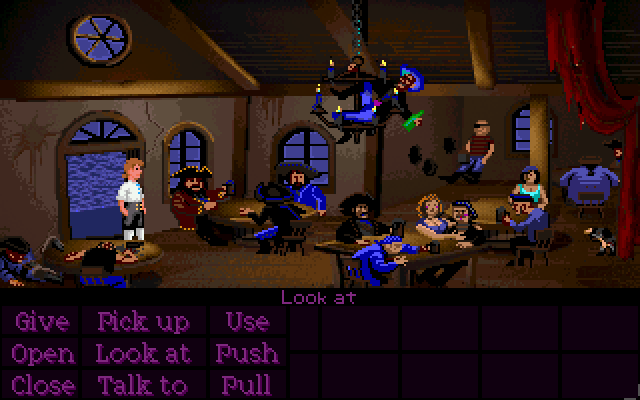
To play The Secret of Monkey Island is to witness the grand payoff of a three year training period on the part of a ludicrously capable game studio. If you ask me, neither Maniac Mansion, Zak McKracken and the Alien Mindbenders, Indiana Jones and the Last Crusade, nor Loom are middling affairs, and I'd have no qualms with a call for any of those games to be recognized as classics, both for what they brought to the table of their genre, and less contextually for their entertainment value as undeniably great individual games. However, there is a reason why the goofy exploits of a certain lovably nebbish pirate wannabe are the subject of what's considered to be LucasFilm Games' breakthrough adventure title, not to mention one of the greatest games of all time, by more than a few.
The Secret of Monkey Island feels like what those four preceding titles were always leading up to, holds the status of a benchmark story game and continues to put most others of its ilk to shame. It's a culmination of improving technology and refined interactive storytelling, the flexing of muscles that the creatively healthy company it sprang from had been gradually developing. There's nary a false step taken; it does just about everything right. It is, in every sense of the overused word, a masterpiece. It's also a pretty fun computer game.
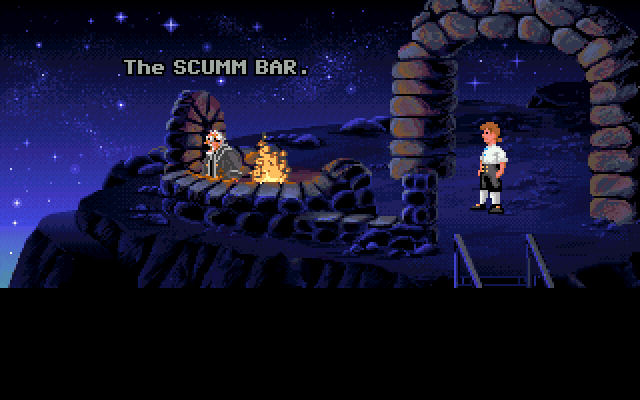
The game kicks off "Deep in the Caribbean" on the Island of Mêlée where we are immediately introduced to our hero Guybrush Threepwood - an eager, clumsy, pony tailed lad who has arrived on the shores of Mêlée to seek his fortune by fulfilling his lifelong hope to become a swashbuckling pirate. While completing the Three Trials tasked to him by the pirate leaders (found, in one of many in-jokes, in The SCUMM Bar) to accomplish this seemingly straightforward goal, Guybrush falls for the island's governor, the more than self-sufficient Elaine Marley, who is eventually kidnapped by the nefarious Ghost Pirate LeChuck in his spectral ship. Assembling an almost able bodied crew and guided by the enigmatic foretellings of a local voodoo lady, Guybrush will sail to LeChuck's secret hideout beneath the mythical Monkey Island, rescue his true love, and maybe learn a few unconventional uses for a rubber chicken along the way.
It's hard to write about a game like Monkey Island without succumbing to the desire to reminisce about one's first experience, which is imprinted in the brain and is a memory often synonymous, fairly or not, with perfection. This probably has to do with the fact that for many people, this game is an indelible part of their childhoods (or if it isn't, it may feel that way). The Secret of Monkey Island is one of those experiences with which you remember your first time, whether it was on your dad's Amiga during its first release or if it was something you discovered, perhaps with the help of an insistent friend, in more recent years. While there is some treachery in letting nostalgia cloud one's memory (and judgment) about a beloved game, the impact that The Secret of Monkey Island, for many the gateway drug to graphic adventures, tends to leave on its audience is nonetheless a testament to its strengths.
And those strengths are far from nostalgic delusions, or else the game would fail to endear itself to today's gamers the way it continues to. One indication of its staying power is the fact that despite its release being in the relatively prehistoric 1990, it still manages to impress on a technical level, even if it's mostly in a "for its time" kind of way. Fifth in the line of SCUMM games, The Secret of Monkey Island updated the engine yet again, taking the interface from Indiana Jones and the Last Crusade (Loom's stripped down, musically rooted interface was a one-time divergence) and making the next natural progression.
Gone is the "What Is" verb, its functionality now integrated as a default part of the point 'n click mechanic. Now, when an interactive hotspot such as a character or an item is moused over, the object is automatically placed on the sentence line, a head-slappingly obvious move that makes you wonder why it wasn't the case from day one. Although there's no wheel reinvention going on here and the game ultimately looks and plays very similarly to Indy3, it's the beneficiary of the hard-earned lessons of its older siblings, bringing SCUMM to a point that really seemed to hit that sweet spot.
Further, it's arguably the first game to truly embody what would become accepted as the LucasArts design philosophy, which does not permit dead-ends and greatly limits death scenarios, if they exist at all. (The one possible way to die in Monkey Island is handled in a humorous manner and you have to go out of your way to see it.). Cutscenes are handled in a more fluid way as well, as they are now triggered by the player's progress rather than being the seemingly random machinations of an internal clock.
Dialogue trees, a rather pivotal genre element introduced with Last Crusade, are reprised here in a much more enjoyable way (and which pretty much every adventure game, or game with dialog trees – I'm looking at the heralded Knights of the Old Republic - would from thenceforth replicate). This is not merely due to the fact that clicking through conversations is no longer a nerve-racking life or death scenario – you cannot choose a "wrong" dialog option in this game – but because the banter between the characters is just in itself so much fun to read. A lot of it is there to provide story information, but the majority of it is there for sheer entertainment, and due to the exceptionally high quality of the writing, it very much succeeds in that.
There are times when the willingness to be goofy goes beyond just providing humor, but drifts into the realm of inspired. Take, for example, a lengthy gag that occurs when Guybrush breaks into the Governor's mansion to retrieve the Idol of Many Hands. When Guybrush enters a room in the mansion's interior and disappears behind the wall, the game takes control of Guybrush's actions and we are left to view the sentence line of the self-piloted interface to help imagine Guybrush's obscured adventures as the screen pans and wacky sound effects ensue. But it's the swordfighting segment that perhaps represents the best of the game's inventive comedy.
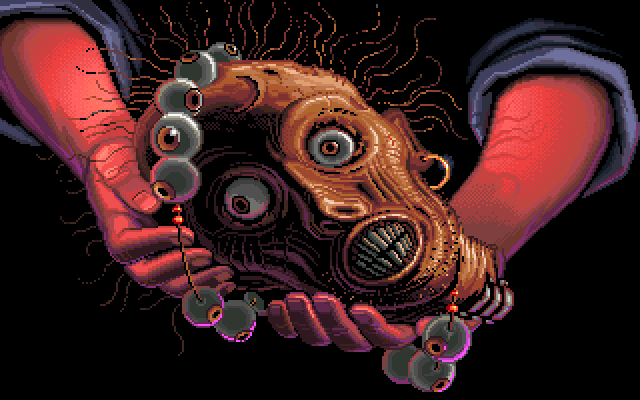
In order to complete one of his Trials, Guybrush must defeat the feared Swordmaster of Mêlée Island, which first requires engaging ordinary citizen pirates to duels. He soon realizes that this is a skill which has much more to do with crossing barbs than crossing swords – he must gradually learn various verbal insults and comebacks until he's amassed an arsenal large enough to achieve victory with some assurance and thus be able to move on to the Swordmaster herself. As Guybrush's grizzled trainer, Captain Smirk, explains to him while teaching him the art of Insult Swordfighting: "You see, kid, your wit's gotta be twice as sharp as your sword." It's a theme that runs throughout the entire Monkey Island series.
Of course, the Swordmaster and Captain Smirk aren't the only personalities associated with this game that you'll remember long after you turn off your computer and go to sleep. The characters of Monkey Island are fun in ways that are often considered the exclusive province of the page, the theatre or the silver screen. The crusty shopkeeper, the not quite decapitated ghost Bob, the bickering Fettucini Brothers, a certain three-headed primate that only seems to show up when it's least useful... the list just goes on. Stan the used ship salesman in particular is such a fan favorite that he would go on to appear in every one of the series' future installments. It's rare enough for a video game to have one memorable character; Monkey Island's got a cast of them.
Truly, the writing (attributed to Gilbert and his two junior designer/writers - future adventure titans Tim Schafer and Dave Grossman) is probably the most praised and cherished aspect of Monkey Island, and rightly so, but the real strength goes beyond the witty one liners, goofy sight gags, intentional anachronisms, and prevalent trademark jokes. The fact that Guybrush almost always has something useful, interesting, or funny to say about virtually any given interactive object doesn't just succeed in making the game more amusing, but goes along way in making it more alive.
If the game developer is always one step ahead of the player, which is surely the case with The Secret of Monkey Island, you're that much more susceptible to being pulled into the game world and accepting it as a living, breathing place. If you can try any inventory object with any interactive area, and get a unique response almost every time, that's not just cool, but an extension of your capacity for suspension of disbelief. It's a level of depth that sells a game universe in a way that all the technology and graphics in the world can't hope to on its own. As influential Monkey Island has been in a number of ways, its competition in that regard is surprisingly thin. Here is a game where the player isn't just allowed to veer off the road of the prescribed goal and fool around – such behavior is encouraged and usually rewarded.
Indeed though, the game is also just plain funny. Comic delivery, an art form that wasn't (and really still isn't) associated with video games favorably, is actually pertinent here and, even more thankfully, executed with competence. The jokes are, you know, actually good, which is such a rarity for the medium that to see an instance like this of comedy being handled so well is an achievement to be savored. It's certainly true that all of the previous LucasFilm Games adventure titles were humorous in nature, some more than others, but Monkey Island is a game that sets out to make you laugh, and succeeds with exceptional consistency that certainly never existed to that degree in the medium before, and has proven even eighteen years later to be an extremely tough act to follow.
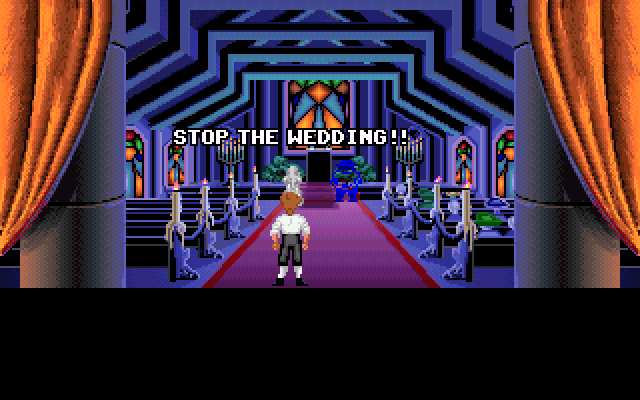
Monkey Island's visual presentation is wisely reliant on quality artwork, the style of which contributes to create a world that offers a romanticized view of the pirate setting laced with supernatural overtones. In short, it's reminiscent of Disneyland's Pirates of the Caribbean theme park ride, which along with the Tim Powers novel On Stranger Tides served as project leader Ron Gilbert's central inspiration for the Monkey Island universe. The game feels sort of like a modern, offbeat fairly tale, possessing an atmosphere that manages to always oozes charm.
Capturing this style, which holds up remarkably well, is fantastic background art and character animation that builds on the already superb work seen in Indiana Jones and the Last Crusade and Loom, resulting in moments that not only enhance the overall experience but are good enough to be revisitable. (A closeup of Guybrush's intense reaction during a meeting with a monstrous creature springs to mind as a highlight.) The music, composed by Michael Land, is catchy and complements the whimsical pirate-y flavor of its subject suitably. Iconic themes such as those for the opening titles, LeChuck, and the SCUMM Bar refuse to depart from your head after invasion.
The game's length is also extremely satisfying, hitting that balance between not too short (Loom) and not too long, which in reality is more a credit to the pacing than anything else. Divided into four (rather arbitrarily lengthed) "Parts" signified by title screens (more music that you won't be able to shake), the game also succeeds in generating an epic feel, and not by dragging the proceeds out with ridiculous puzzles, either - another unusual accomplishment. By the time it comes for the titular Monkey Island to even make its appearance, the game already seems like it's provided your money's worth (To quote Guybrush upon his first glimpse of Monkey Island itself: "WOW! This was well worth $59.95 + tax!"), and yet none of the calories are empty. I can certainly remember a more callow version of myself (who admittedly had severely limited adventure game experience) being amazed by the scope of this game.
The fandom associated with Monkey Island cannot be glossed over as though it were an insignificant part of the game's legacy. After all, this site is an unabashed product of that fandom, which no one would accuse of being modest (if in spirit more than number). Lines from the game have become memes, and the still celebrated title often manages to keep finding itself on the northern pole of many Top Ten lists, reaffirming what critics and fans saw in the game upon its initial release. What I think really makes the Monkey Island following worth mentioning though is not merely its devotion but its resilience. We're sort of like the MSTies (Mystery Science Theater 3000 fans) of the gaming world in our vicious loyalty. Franchises with an obsessive following are not hard to come by, but you will find few fans with the level of commitment that Monkey Island devotees have.
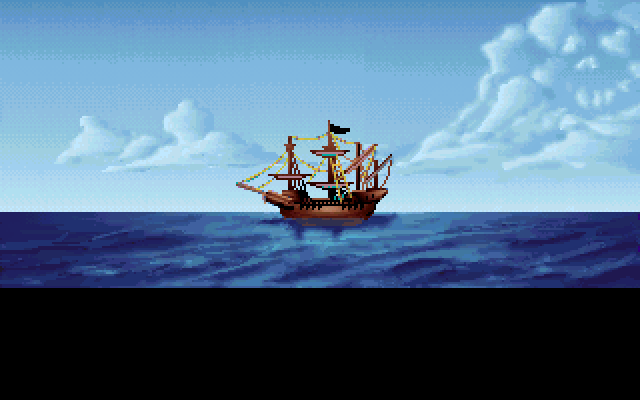
It's fair to ask why Monkey Island has had such longevity in spite of the intervening years and the best efforts of its copyright holders to bury its existence. My take on it is that this is probably the first game that made many aware that video games could actually possess things like memorable characters, great writing, a compelling world, and could otherwise engross in ways that were perhaps assumed to be reserved for the likes of movies or literature. While Roger Ebert's overexposed stance on games stirred fury in the hearts of gamers everywhere, a rebuttal would be difficult for me to summon in a world where Guybrush's misadventures did not exist. Monkey Island is a discovery, one that you want to share with others when it becomes fills in what's missing from your perspective of what games can be.
Yet as much as that all rings true, as much as I think Monkey Island is worthy of being deconstructed and studied, I must reiterate a point I raised with Maniac Mansion: above any significance we could attach to it, The Secret of Monkey Island needs to recognize for its humble accomplishment of being really fun, the reason one would want to buy a computer game. It's first rate entertainment that makes good on its promise of transporting you to a world more endearing than our own for several hours.
Finding flaws isn't an impossible task, but being tasked is the only reason for doing it. There is no such thing as a flawless game – what separates a great game from a bad one is how much those flaws matter. I could whine about the occasional puzzle that stretches my definition of logical, but it's hard to come up with substantial negatives for this one without feeling like I'm straw grasping.
It's useful to consider why Monkey Island and games like it hold up so formidably against time, which always seems to affect games far more harshly than any other type of entertainment due to its marriage with technology. It's not a question with an obvious answer; if this were true, there wouldn't be such a crush of imitators (read: any most modern adventure games) that so badly miss the mark, even if their contain a shocking;u high amount of superficial nods to the oldies, and every game well-received in its time would be worth revisiting decade later.
The Secret of Monkey Island, along with the very best of the adventure genre, holds up simply because the things that it depends on for its entertainment value tend to be much more durable against, if not impervious to, age. Good writing, a world worth revisiting, endearing characters, wit... these are things that simply do not deteriorate. If you replay Monkey Island today, the worst you could say about it is that the backgrounds look pixel-y and that the audio is too evidently the product of soundcards outdated a few generations. Other than remarks such as those, is there really anything about these games that isn't as excellent now as it was on day one?
A review by Jason, whose Aunt Tillie makes serviceable carrot cake
Five out of five Murray skulls
Pros: Superlatively fun, funny, and influential game that defines the word classic.
Cons: Visuals and sounds are somewhat dated; not effective as a substitute for car fuel.